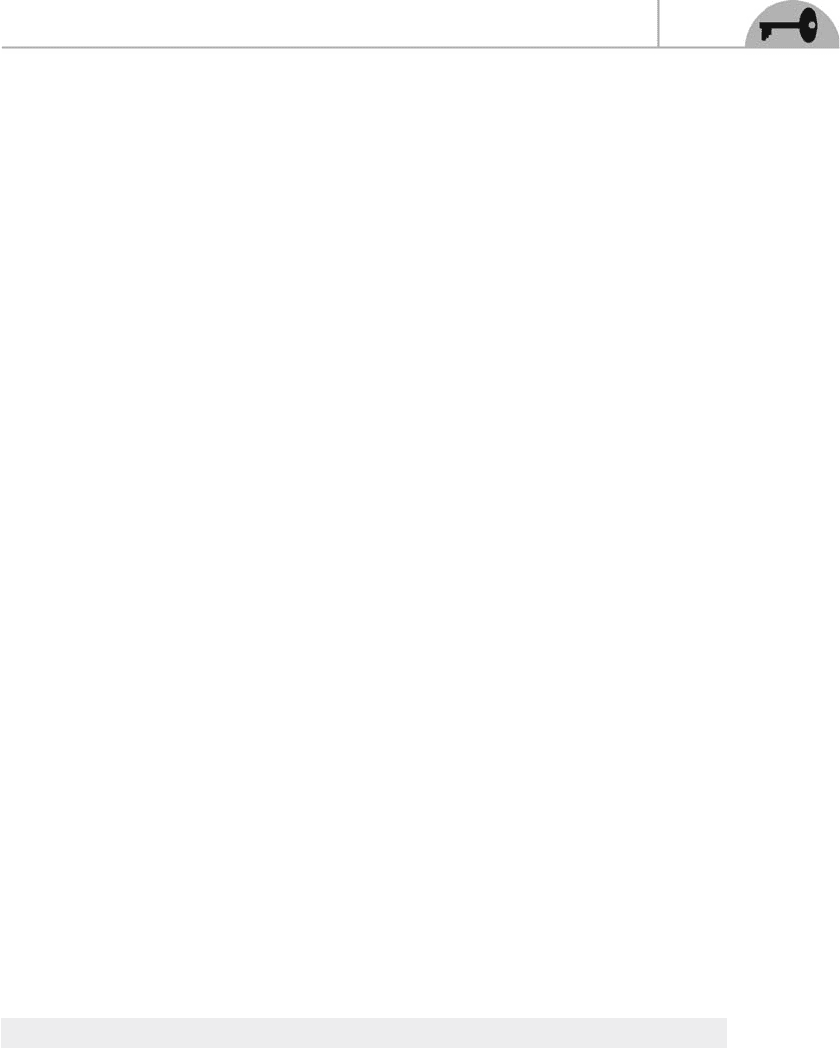Italian Demystified. A self-Teaching Guide
Подождите немного. Документ загружается.


• Change the -o ending of a descriptive adjective to -a.
certo certain certa-
lento slow lenta-
• Add the adverb ending -mente.
certa- certamente certainly
lenta- lentamente slowly
• If the adjective ends in -e, instead of -o, then simply add on -mente.
elegante elegant elegantemente elegantly
semplice simple semplicemente simply
• However, if the adjective ends in -le or -re and is preceded by a vowel, then
the -e is dropped.
facile easy facilmente easily
popolare popular popolarmente popularly
• A few exceptions to these rules are the following:
benevolo benevolent benevolmente benevolently
leggero light leggermente lightly
violento violent violentemente violently
Here are some common Italian adverbs of manner:
Adjective Adverb of Manner
enorme enormous enormemente enormously
felice happy felicemente happily
preciso precise precisamente precisely
raro rare raramente rarely
regolare regular regolarmente regularly
speciale special specialmente especially
triste sad tristemente sadly
utile useful utilmente usefully
vero true veramente truly
Oral Practice
Practice saying the following sentences out loud.
Sta dicendo la verità? Is he telling the truth?
Certamente. Certainly.
CHAPTER 18 Using Object Pronouns 357

358 Italian Demystifi ed
Come guida lei? How does she drive?
Lentamente. Slowly.
Come insegna l’italiano il How does the professor teach Italian?
professore?
Facilmente. Easily.
Come è percepito quel fi lm? How is that movie perceived?
Popolarmente. Popularly.
Come dobbiamo trattare la gente? How must we treat people?
Benevolmente. Benevolently.
Come devo condire l’insalata? How should I dress the salad?
Leggermente. Lightly.
Ti piace l’italiano? Do you like Italian?
Enormemente. Enormously.
Written Practice 5
Answer each question with the correct adverb, as indicated.
1. Come hanno reagito? How did they react?
. Happily.
2. Come hanno fatto quella cosa? How did they do that thing?
. Precisely.
3. Quante volte viene lui con voi? How many times does he come with you?
. Rarely.
4. Quante volte guardi la televisione? How many times do you watch
television?
. Regularly.
5. Anche lui deve studiare, vero? He also has to study, doesn’t he?
lui! Especially him!
6. Come suona lui di solito? How does he usually play?
. Sadly.

OTHER TYPES OF ADVERBS
Adverbs cover a wide range of meanings, from time relations to quantity. Here are
some very common adverbs and adverbial phrases, many of which have been intro-
duced in previous chapters.
allora then, thus poi after, then
anche also, too presto early
ancora again, still, yet prima fi r s t , before
anzi as a matter of fact purtroppo unfortunately
appena just, barely quasi almost
di nuovo again, anew qui here
domani tomorrow solo only
fra (tra) poco in a little while spesso often
già already stamani this morning
ieri yesterday stasera this evening
lì, là there subito right away
lontano far tardi late
male bad(ly) vicino near(by)
oggi today
The adjectives molto, tanto, poco, troppo, and parecchio can also be used as
adverbs. But be careful! When used as adverbs, there is no agreement as there is
when used as adjectives.
Adjective Adverb
Lei ha molti She has a lot Lei è molto She is very
soldi. of money. intelligente. intelligent.
Ci sono pochi There are few Loro studiano They study
studenti. students. poco. little.
To determine if a word such as molto is an adjective or adverb, check the word
that follows it in the sentence. If it is a noun, then molto is an adjective, agreeing
with the noun. Otherwise, it is an adverb. In this case, no agreement pattern is
required.
CHAPTER 18 Using Object Pronouns 359

360 Italian Demystifi ed
Oral Practice
Practice saying the following sentences out loud.
Loro vanno spesso al cinema? Do they often go to the movies?
Purtroppo. Unfortunately.
Marco l’ha fatto ancora una volta? Did Mark do it again (one more time)?
Sì, ieri. Yes, yesterday.
Dove abitano? Where do they live?
Lei abita lontano, e lui vicino. She lives far, and he nearby.
È tardi? Is it late?
Sì, sono quasi le tre. Yes, it is almost three o’clock.
Lui ha appena fi nito di lavorare? Has he just fi nished working?
Sì, e anzi ha lavorato tanto oggi. Yes, and, as a matter of fact, he worked
a lot today.
Che cosa farai domani? What are you going to do tomorrow?
Prima voglio studiare e poi uscire. First I want to study, and then go out.
Written Practice 6
Fill in the blanks with the appropriate adverbs or adjectives, as necessary.
1. Quando verrai, stamani o stasera? When are you coming, this morning or
tonight?
Vengo . I am coming right away.
2. Chi va con Gino in centro? Who is going with Gino downtown?
io.Only I.
3. Dov’è il computer, lì? Where is the computer, there?
No, è . No, it is here.
4. Quando andrai in centro? When are you going downtown?
. In a little while.
5. Allora, perché non vieni anche tu? Then, why don’t you also come?
Perché sto . Because I feel bad (unwell).

6. Hai fame, Maria? Are you hungry, Mary?
Sì, ho fame. Yes, I am very hungry.
7. Quanto tempo hai lavorato ieri, Maria? How much time did you work
yesterday, Mary?
. A little.
Computers and the Internet
The topic of computers and the Internet is very important in today’s world. So, here
are some useful Italian vocabulary words to learn:
il computer computer
il software software
l’hardware hardware
lo schermo monitor, screen
la stampante printer
la tastiera keyboard
il mouse mouse
Internet (no article is used in Italian) Internet
il sito web website
l’indirizzo e-mail e-mail address
navigare to navigate
chiocciola @
punto dot
QUIZ
Answer each question affi rmatively with an appropriate direct object pronoun. For
example:
Mi hai chiamato ieri? Did you call me yesterday?
Sì, ti ho chiamato ieri.
Yes, I called you yesterday.
1. Mi chiamerai stasera?
.
CHAPTER 18 Using Object Pronouns 361

362 Italian Demystifi ed
Ti ho invitato alla festa, vero?
.
Chiamerai Giovanni domani?
.
Vedrai Maria domani?
.
Ci inviterai alla festa?
.
Vi ho invitato alla festa, vero?
.
Vedrai le tue amiche domani?
.
Vedrai i tuoi genitori domani?
.
Answer each question affi rmatively with an appropriate indirect object pronoun.
2. Mi dirai il tuo nome?
.
Ti ho dato il mio indirizzo, vero?
.
Parlerai alla professoressa domani?
.
Parlerai al signor Mirri domani?
.
Ci scriverai per Natale?
.
Vi ho scritto per Natale, vero?
.

Parlerai alle tue amiche domani?
.
Parlerai ai tuoi genitori domani?
.
Answer each question affi rmatively, replacing the italicized direct object with an
appropriate direct object pronoun and making any necessary changes to the past
participle.
3. Hai letto il giornale?
.
Hai letto la rivista?
.
Hai chiamato gli zii?
.
Hai chiamato le zie?
.
Hai mangiato la carne?
.
Hai mangiato le patate?
.
Hai guardato quel programma?
.
Hai guardato quei programmi?
.
Change each adjective into an adverb of manner or vice versa, as necessary.
4. certamente
semplice
facilmente
popolare
CHAPTER 18 Using Object Pronouns 363

364 Italian Demystifi ed
benevolmente
leggero
enorme
felicemente
preciso
specialmente
utile
veramente
Choose the appropriate adverb for each sentence.
5. Noi andiamo al cinema.
(a) spesso
(b) già
6. Lui l’ha fatto una volta.
(a) ancora
(b) sempre
7. Mio fratello vive , e mia sorella vicino.
(a) lontano
(b) sempre
8. È l’una.
(a) quasi
(b) poi
Personal Matters! Answer each question appropriately.
9. Che tipo di computer hai?
.
10. Qual è il tuo indirizzo e-mail?
.

365
CHAPTER 19
Using Double
and Attached
Object Pronouns
Here’s what you will learn in this chapter:
Double Object Pronouns
Attached Object Pronouns
Stressed Pronouns
Still More About the Verb Piacere
Copyright © 2007 by The McGraw-Hill Companies, Inc. Click here for terms of use.

366 Italian Demystifi ed
Double Object Pronouns
Dove sono le riviste? Te le ho già date. Where are the magazines? I have already
given them to you. You may have noticed that the second sentence contains two
pronouns in sequence: te le. The fi rst pronoun is really the indirect object pronoun
ti, with a slight modifi cation, and the second one is the direct object pronoun le,
which replaces le riviste.
When both direct and indirect object pronouns are required in a sentence, the
following rules apply:
• The indirect object pronoun always precedes the direct object pronoun, and
the only possible direct object forms in this case are: lo, la, li, and le.
Marco mi darà il libro domani. Mark will give the book to me
tomorrow.
Marco me lo darà domani. Mark will give it to me tomorrow.
• The indirect pronouns mi, ti, ci, and vi are changed to me, te, ce, and ve,
respectively.
Maria ti darà i libri domani. Mary will give you the books
tomorrow.
Maria te li darà domani. Mary will give them to you
tomorrow.
Maria vi comprerà le scarpe per Mary will buy you shoes for
Natale. Christmas.
Maria ve le comprerà per Natale. Mary will buy you them for
Christmas.
Maria ci ha dato i suoi libri. Mary has given her books to us.
Maria
ce li ha dati. Mary has given them to us.
NOTE:
NOTE: In the previous example there is still agreement between the direct
object pronoun and the past participle.
• The indirect pronouns gli and le are both changed to glie, and attached to
lo, la, li, and le to form one word: glielo, glieli, gliela, gliele.
Marco darà il libro a Paolo Mark will give the book to Paul
domani. tomorrow.
Marco glielo darà domani. Mark will give it to him tomorrow.
